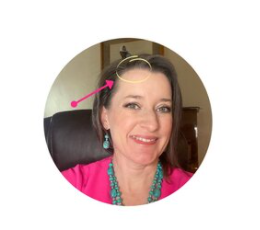
Thought it was a pimple BUT it wouldn’t heal.
My dad died from melanoma, and every year on his birthday, I share information about skin cancer. However, this year is unique because it was the year I got skin cancer. After all the years I spent preaching about the sun and sun safety, I ended up with basal cell carcinoma. Although basal cell cancers do not easily spread and if you have to have skin cancer, it seems to be the one to have…so “they” say.
My mom also has basal cell carcinoma; yes, I am genetically predisposed to skin cancer. However, genetics loads the gun, and the environment pulls the trigger. Even though the sun plays a big part in skin cancer, your lifestyle also matters. How you treat your genes will have the most significant influence on if you get cancer or not.
When I was a kid, sunscreen was SPF 8, and one rarely used it. Plus, I had a friend who got a gorgeous golden-brown tan every summer, and I always looked pastie. I was hell-bent on getting that golden glow that ended up being flaming red and blistered. I experienced many bad sunburns as a child, and when I was in college, I thought tanning beds were a great idea.
Skin cancer affects about one in 5 adults in the United States. It’s also preventable in most cases, as most skin cancers are caused by too much sun or indoor tanning.
Some recent developments may help with diagnosis and treatment. New technology using shortwave rays similar to a retail scanner can detect skin cancer as accurately as conventional methods. This could enable early diagnosis without having to do skin biopsies.
Also, while COVID-19 has delayed treatment for some patients, teledermatology growth could help millions more. Video sessions and apps could increase access to dermatologists and oncologists and enhance the quality of care. I put off my appointment for 6 months because of COVID and I am now kicking myself!
Meanwhile, there is already overwhelming evidence about the effectiveness of sunscreens and other simple precautions. Learn more about skin cancer and how to protect yourself and your family.
Basic Facts about Skin Cancer:
- Know the varieties. There are two main types of skin cancer, melanoma, and non-melanoma, including basal and squamous cell skin cancers. Melanoma is more serious but much less common. It accounts for about 1% of cases.
- Identify the causes. Most skin cancers are caused by exposure to ultraviolet radiation from the sun or artificial tanning. Other causes can include certain chemicals or human papillomavirus.
- Understand your risk. Many factors can make you more vulnerable. You may need to take extra care if you have fair skin, a history of severe sunburns, or multiple moles. Talk with your doctor about your individual concerns.
PREVENTING SKIN CANCER:
- Limit sun exposure. A little sun works wonders for your mental health and vitamin D levels. However, you can help prevent wrinkles and skin cancer by avoiding tanning or burning. It also helps to stay in the shade when the sun is intense, usually from about 10 am to 4 pm.
- Apply sunscreen. Most experts recommend about two tablespoons of sunscreen with an SPF of 30 or higher. Reapply regularly if you’re outdoors for more than a half-hour. I highly recommend a non-toxic brand free of junky chemicals. 3rd Rock Essentials is a great choice. Use code PIPER for a discount.
- Cover up. Hats, shawls, and umbrellas help too. Some clothing manufacturers even use UPF labels to show how much protection their garments provide.
- Wear sunglasses. Your eyes and surrounding skin need coverage too. Look for shades that block at least 99% of UVA and UVB light.
- Consume vitamin A. Studies show that foods high in Vitamin A may help prevent skin cancer. Smart choices include sweet potatoes, broccoli, carrots, and mangoes.
- Check your surroundings. Water, sand, and snow reflect the sun so that you can wind up with almost a double dose. High altitudes intensify the effects too.
- Avoid tanning beds. According to the American Academy of Dermatologists, women who tan indoors before they turn 30 are six times more likely to get melanoma. Listen to the FDA and the World Health Organization warnings that tanning devices pose serious health risks.
TREATING SKIN CANCER:
- Scan your skin. Skin cancers are highly curable if caught early, so examine your skin with a mirror each month. Tell your doctor about any changes or areas of concern. If you’re at high risk, you may also need an examination by a dermatologist at least once a year.
- Consult your doctor. Many treatment options are dependent on what type of skin cancer you have and other factors. Your physician may recommend surgery, laser treatments, or medication.
- Follow up. Having skin cancer once puts you at a higher risk of developing it again. Follow your doctor’s orders for follow up care.
Skin cancer rates have been increasing for years, but you can lower your risks. Limit your exposure to the sun and use sunscreen consistently year-round. That may be especially important now if you’re doing more outdoor exercising and dining. Your skin will look younger and healthier.
